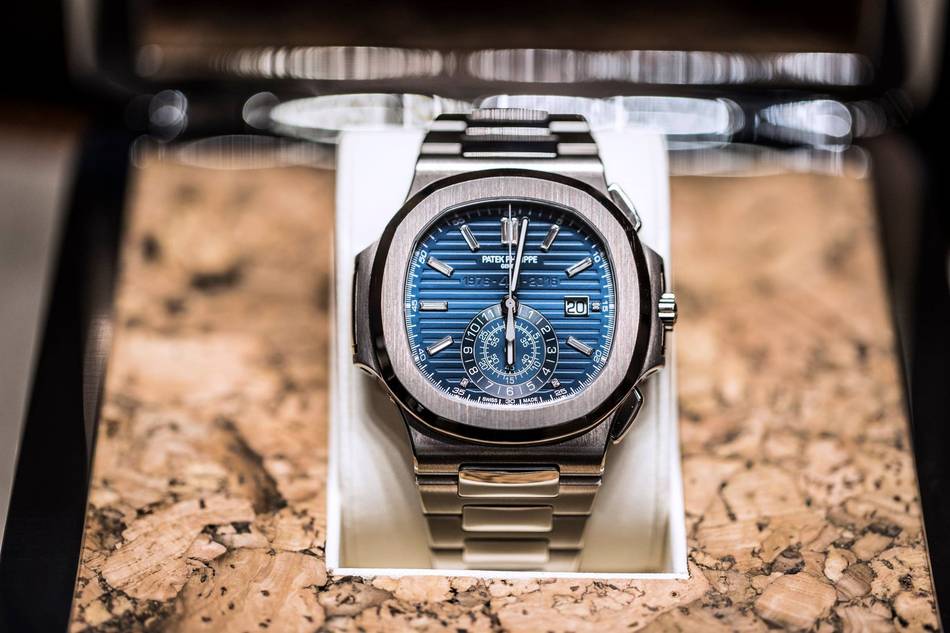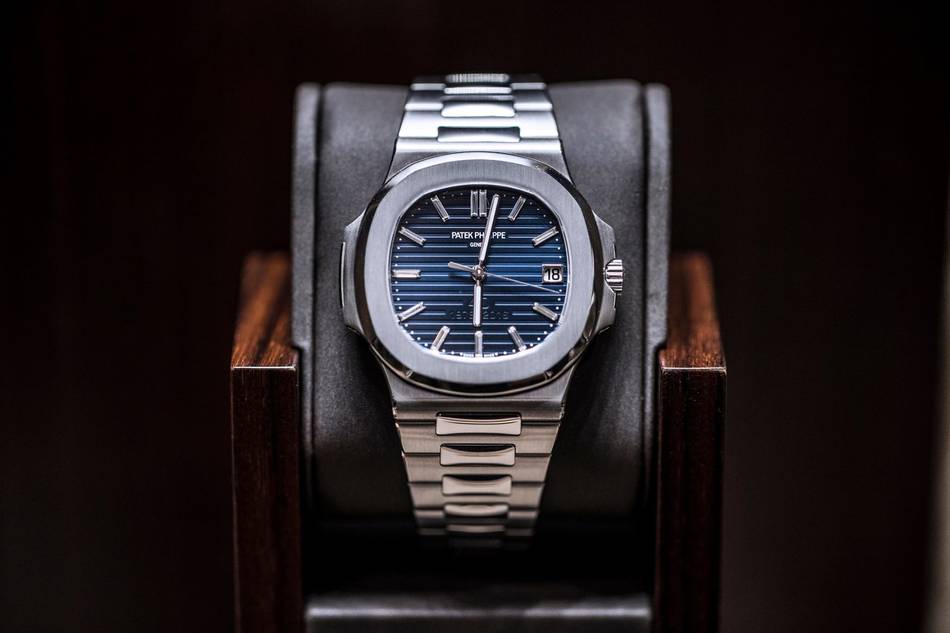Text by Kien Lee | Photos by Cortina Watch
To tell the story of the Nautilus, we need to go back to 1976 when Henri Stern was president of the family-run enterprise, and his son Philippe, who already held an executive position, was poised to succeed him.
The handover presented a timely opportunity and Philippe decided to launch a sports wristwatch for the first time in the 137-year history of the manufacture. For this, Patek Philippe enlisted Gérald Genta, one of the most gifted watch designers of the 20th century, to come up with an innovative timepiece, one unlike any seen at Patek Philippe or in the entire watch industry for that matter.
And thus the Nautilus Ref. 3700/1A was born.
The first Nautilus was voluminous and made of steel, bucking the prevailing trend that saw slender watches in gold. It was also water resistant to 120 meters, a sensation at the time. And unlike any other wristwatch, it embodied a maritime, nautical aspect: Philippe Stern was himself a passionate skipper and successful regatta contestant on Lake Geneva.
From a visual perspective, the Nautilus stood out with two lateral case extension ridges at 9 and 3 o'clock, resembling hinges that joined the two-part case ensemble, once again defying the convention of three-part cases at the time. This design was inspired by the locking mechanisms of classic ocean liner portholes that could be sealed to prevent the ingress of water.
The crystal was framed by an octagonal bezel with gently curved sides and rounded corners, satin-finished on the upper plane and mirror-polished on the beveled flanks.
The solid stainless steel bracelet featured the same matt/gloss effect. Despite its ruggedness, it was surprisingly supple on the wrist.

The dial, in a blue-tint charcoal, - oh, that famous "nautilus blue dial" that shimmers in the light and looks modestly black in the dark -, stood out with a horizontal embossed pattern and was graced with applied luminous baton hour markers to match the slender luminous baton hands.
The name, Nautilus turned out to be a perfect fit, whether it was associated with cephalopod mollusks and their beautiful spiral shells or with Captain Nemo's submarine that Jules Verne dispatched on a perilous expedition in his book Twenty Thousand Leagues Under the Sea.
For the occasion, the Swiss manufacture has launched two limited-edition Nautilus 40th Anniversary models, the 5976/1G and the 5711/1P.
The Ref. 5711/1P with the 40-mm platinum case pays tribute to the original Nautilus Ref. 3700/1A "Jumbo" dating back to 1976, while the 44-mm Nautilus flyback chronograph Ref. 5976/1G draws inspiration from the redesigned 30th anniversary collection introduced in 2006. Both models feature a blue dial with diamond hour markers, the typical Nautilus embossed decor, and a discreet recessed anniversary logo.
 The Nautilus 5711/1A launched in 2006, with an open caseback display
The Nautilus 5711/1A launched in 2006, with an open caseback display
Since then, the Nautilus has evolved every so slightly through the ages, with the most significant milestone being its 30th anniversary, which saw the two-part case superseded by a three-part construction, and crowned with the launch of the Ref. 5980/1A self-winding flyback chronograph model.
Several models have since followed, with variations such as Annual Calendar Nautilus, different coloured dials, chronograph with leather straps, a ladies collection as well.
In 2016, two new limited-edition Nautilus models have been launched on the occasion of the 40th anniversary subtly allude to the history of Patek Philippe's first casually elegant model family.
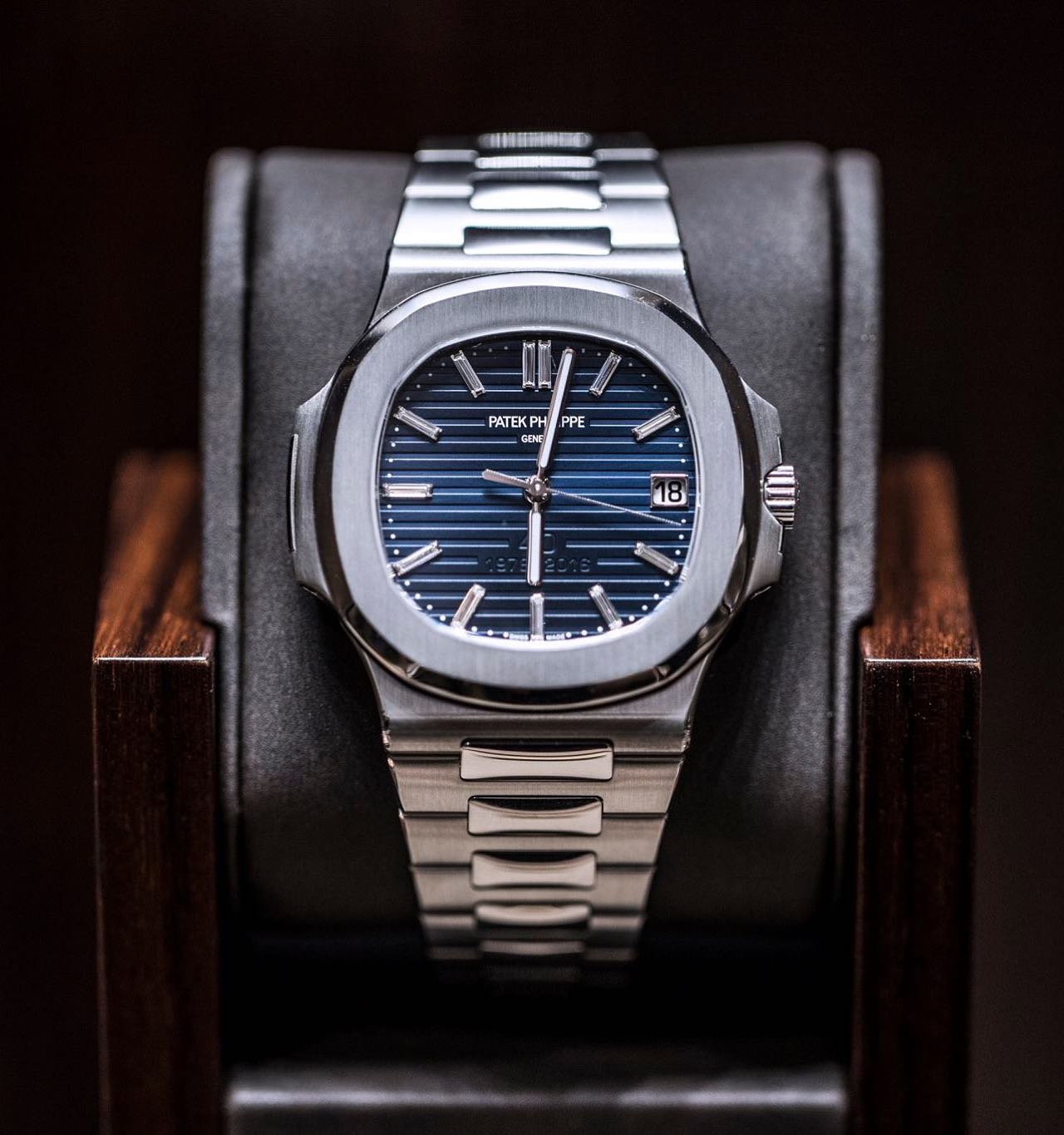
5711/1P 40MM Nautilus in Platinum
The first, the Ref. 5711/1P with the 40-mm platinum case pays tribute to the original Nautilus Ref. 3700/1A "Jumbo" dating back to 1976. Cr
Crafted from solid platinum 950, the new Nautilus Ref. 5711/1P is fitted with a flawless rare white Top Wesselton diamond (approx. 0.02 ct.) in the bezel above the lugs at 6 o'clock. Its dial is made of 18K gold and unlike the original Nautilus features a dark blue hue with a bright/dark gradation from the inside to the outside that perfectly complements the cool shimmer of platinum and assures a superb contrast of the hour markers: 12 applied batons in 18K white gold with flawless Top Wesselton baguette diamonds with a total weight of approx. 0.34 ct.
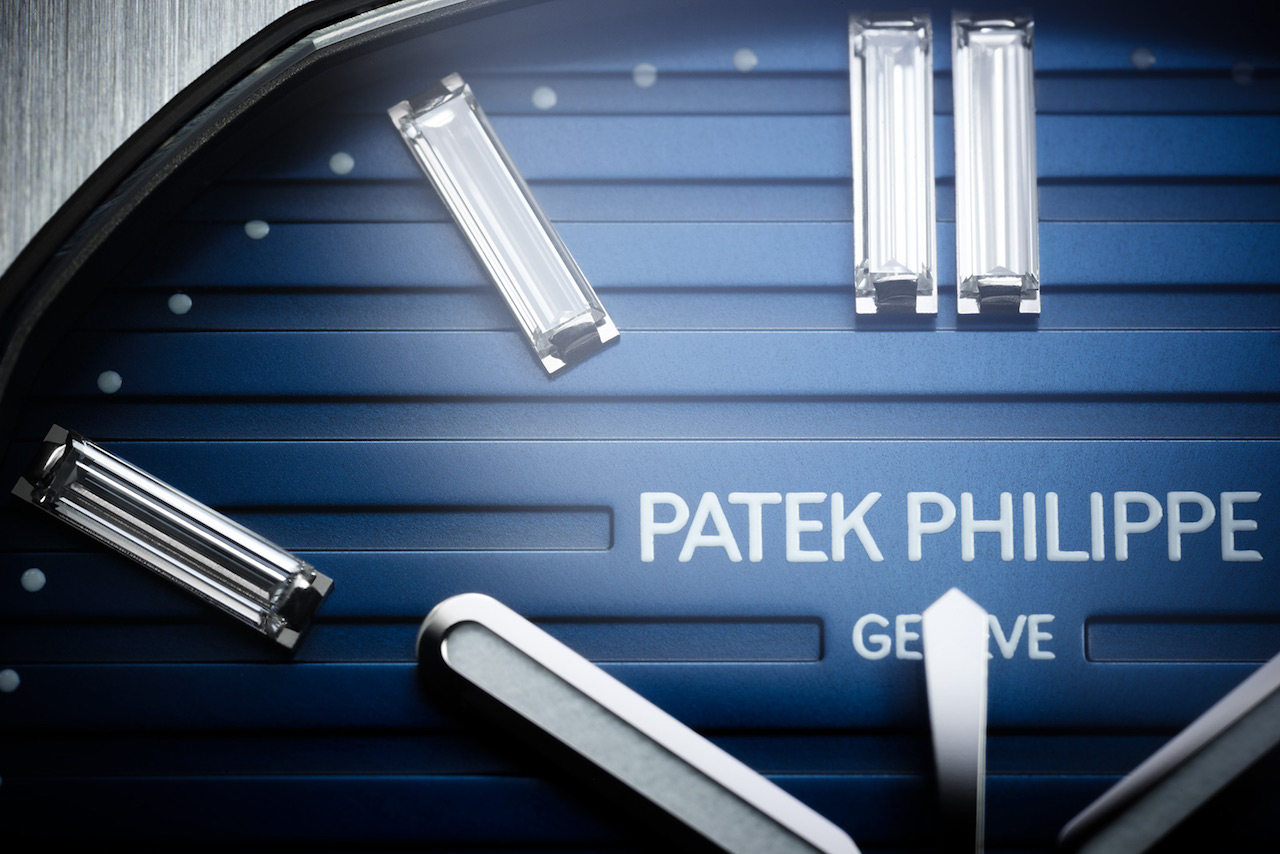
The blue sunburst background features the typical horizontal Nautilus embossing and, in the bottom half of the dial, the very discreet two-line anniversary citation "40" and "1976–2016". The date aperture, also slightly larger in proportion to the bigger case, is located at 3 o'clock and set in a polished 18K white-gold frame.

Against this backdrop, the luminous baton-style hour and minute hands in white gold and a svelte, counterbalanced seconds hand keep track of the time with superior accuracy. The daily rate deviation is merely -3 to +2 seconds, clearly exceeding the benchmark officially imposed on a chronometer.
Crafted in a limited edition of 700 individually numbered watches, each comes in an anniversary box that also contains the Certificate of Origin and an anniversary document. Made of brown natural cork, the box is an authentic replica of the stylish 1976 original.
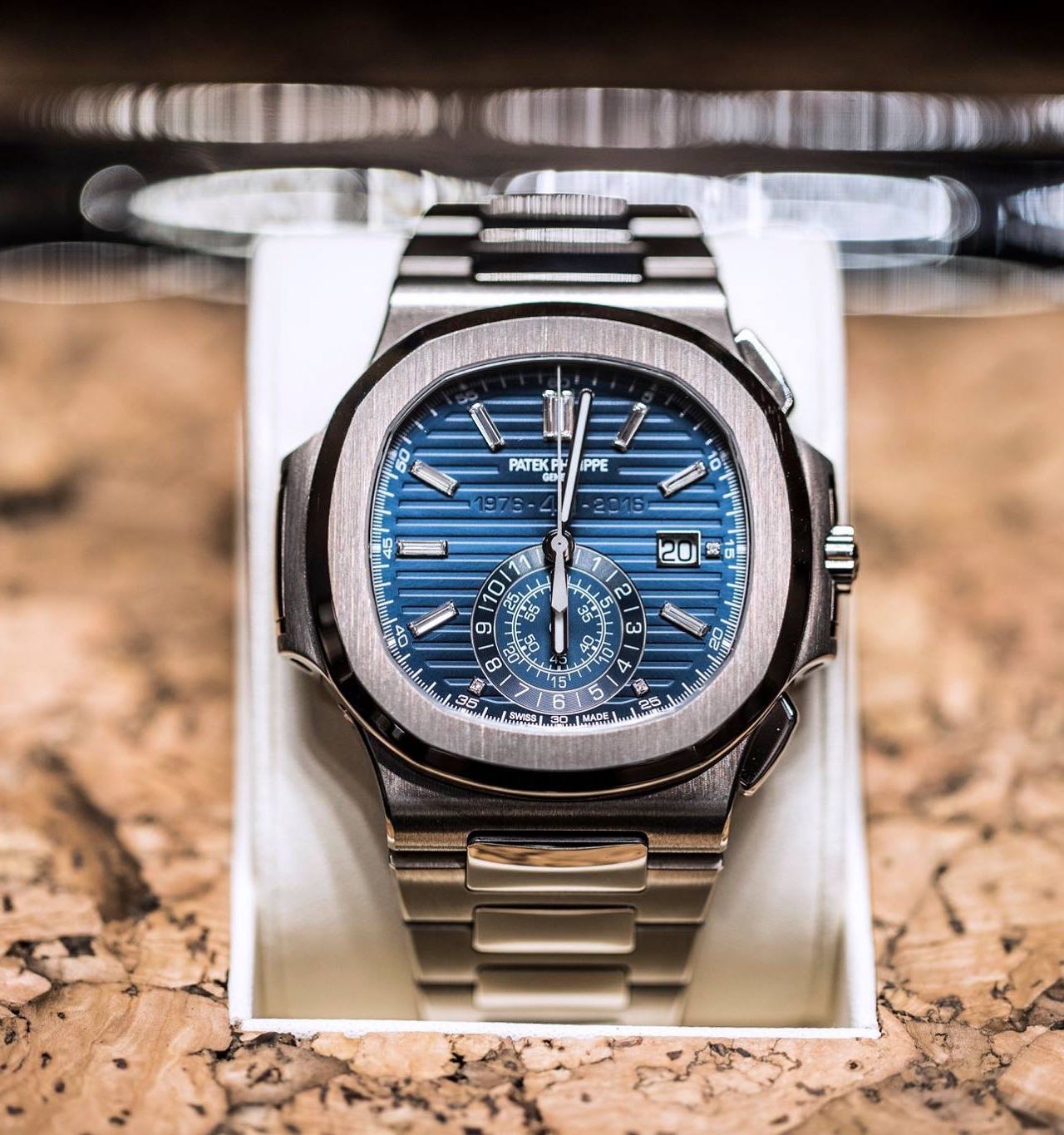
Ref. 5976/1G 44MM Nautilus 18K Gold
The second, the 44-mm Nautilus flyback chronograph Ref. 5976/1G salutes the tastefully redesigned 30th anniversary collection first introduced in 2006.
Encased in 18K white gold, the Ref. 5976/1G has an oversized width of 49.25 mm (3 to 9 o'clock, including screw-down crown), a massive 3.6 mm wider than the predecessor model. Both chronograph pushers are harmoniously integrated in the design and conveniently operable. At the same time, the legibility of the chronograph functions have been optimized.

The larger format of the watch has given more space for an enlarged aperture date that is set in a mirror-polished white-gold frame.
The monocounter at 6 o'clock has grown as well, which makes it easier to read the results of short-time measurements. Its three concentric scales include the 12-hour counter on the outside as well as the minute counters from 1 to 30 in the middle and from 31 to 60 on the inside. The applied hour markers – flawless Top Wesselton baguette and princess-cut diamonds – discreetly encircle the dial and accentuate its finesse.

It features the horizontal Nautilus-style embossed decor and, in the upper half of the dial, the anniversary citation "1976 – 40 – 2016".
The proprietary chronograph movement CH 28-520 C, developed and crafted in-house, is wound automatically by a heavy 21K gold central rotor. The start/stop and flyback/reset chronograph functions are controlled by a classic column-wheel mechanism with a vertical disk clutch that handles the engagement and disengagement operations. Because it is virtually friction-free, the chronograph hand can be used as a continuously running seconds hand without causing mechanical wear. Further features include the instantaneous date change with a switching cycle of one-tenth of a second as well as the Gyromax® balance invented by Patek Philippe. The balance is paired with a patented Spiromax® balance spring made of high-tech Silinvar®.
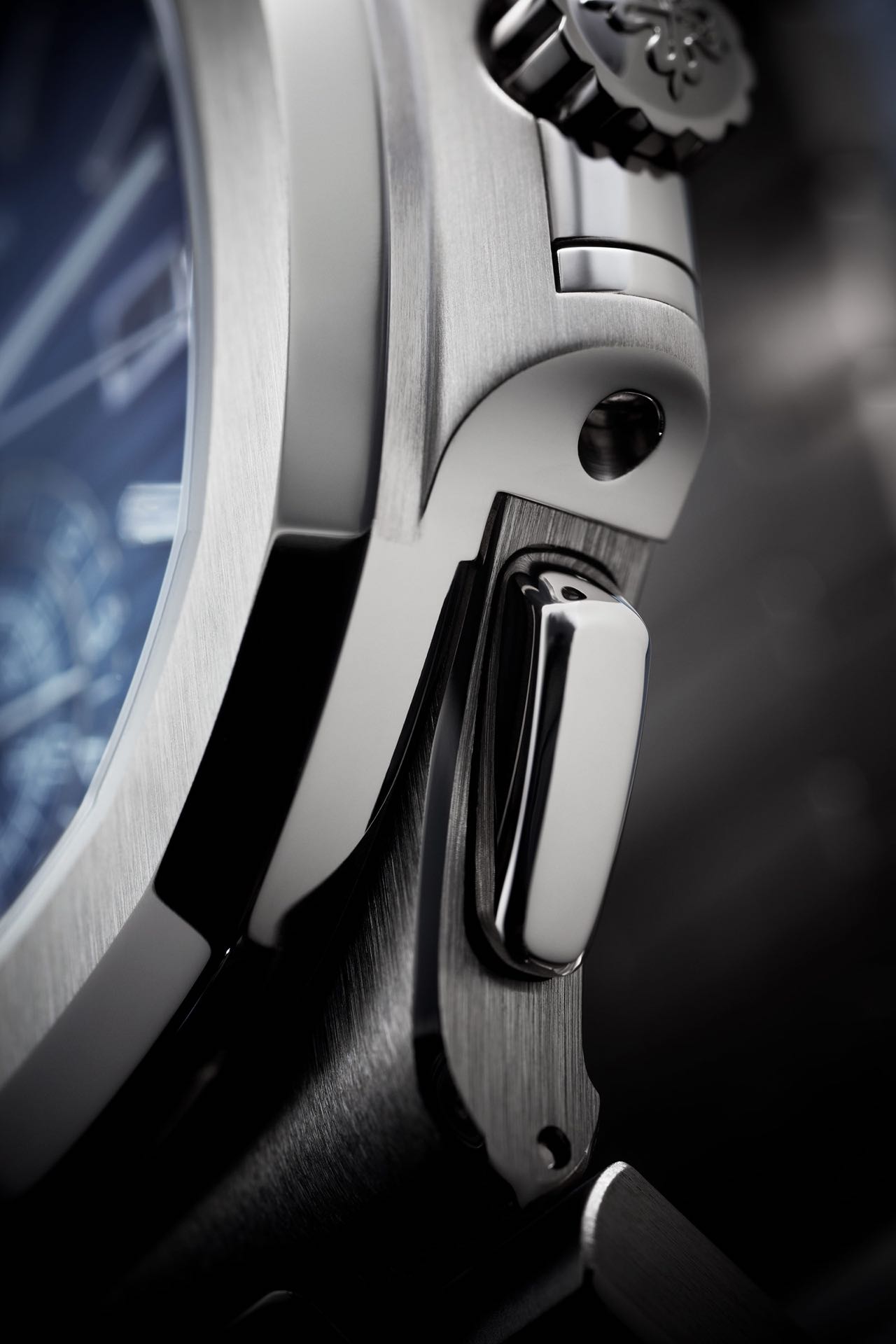
It is totally antimagnetic, corrosion-resistant, and breathes concentrically thanks to the Patek Philippe terminal curve in the hairspring plane, which further optimizes isochronism.
Crafted in a limited edition of 1,300 numbered watches. Each one comes in an anniversary box that also contains the Certificate of Origin and an anniversary document.


A Nautilus for the Ages
Just like how Philippe marketed the original, with advertisements and headlines such as "One of the world's costliest watches is made of steel" and "It goes with a wetsuit as well as with a tuxedo", the Nautilus of today isn't the most expensive steel watch on the market, but it certainly is one of the most desirable, bar none.
And yes, it still looks great. Whatever outfit it's matched with.
Patek Philippe Marina Bay Sands
The Shoppes at Marina Bay Sands
2 Bay Front Avenue #B2-239
Singapore 018972
Tel: (65) 6688 7008
Patek Philippe ION Orchard
2 Orchard Turn, #02-03
Singapore 238801
Tel: (65) 6509 9238
